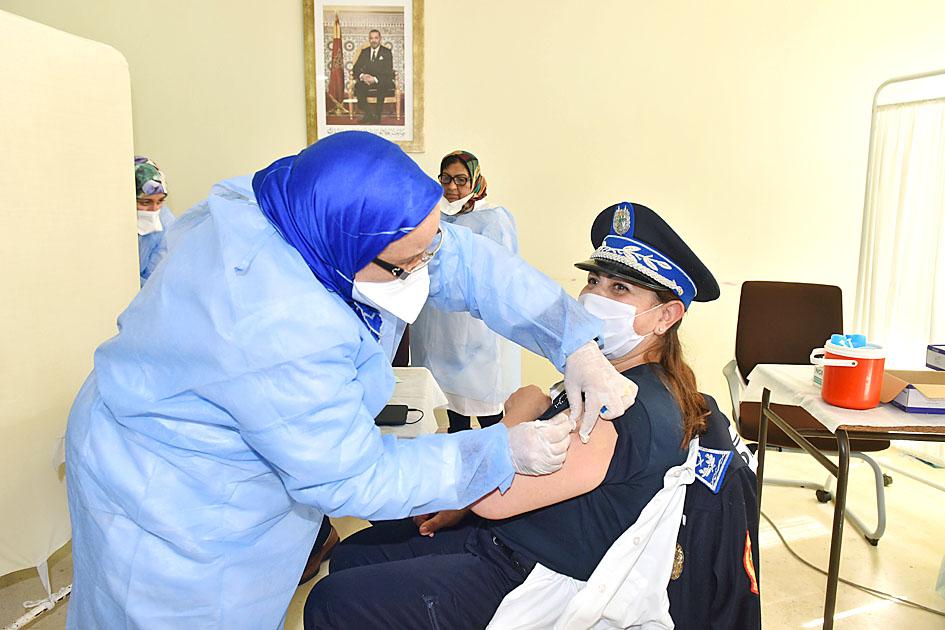Scores of Moroccan health workers streamed to a spacious white tent erected outside the Avicenne University Hospital in the capital, Rabat, to get their first dose of COVID-19 vaccines, as a mass vaccination effort began on Friday in the North African country.
The bustling vaccination center — one of 600 set up in Rabat alone — aims to inject more than 4,000 health professionals with vaccine doses within three weeks.
That is an example of the ambitious targets set by Morocco, which has one of Africa’s most advanced COVID-19 vaccination plans in place so far.

Photo: EPA-EFE
While European countries and North America started vaccinating several weeks ago, Africa is only just beginning to receive its first doses.
Moroccan King Mohammed VI received the country’s first injection on Thursday, while nationwide vaccinations began on Friday just as the country confirmed its first case of the virus variant first identified in Britain.
Among the first people to walk in to the university hospital tent was Abdelatif Asmamaa, a 58-year-old nurse who has been working on the front lines of the pandemic since March.
Before the first of his two doses was administered, Asmamaa, who has high blood pressure, was greeted by medical staff who inquired about his health status, then proceeded to inject him with the Covishield vaccine, developed by the University of Oxford and AstraZeneca.
‘It’s an exciting atmosphere,” he said, checking a document indicating when he would receive his second jab. “I feel nothing, it’s like the seasonal flu shot.”
In cubicles scattered across the tent, other nurses, doctors and Moroccan Ministry of Health personnel were getting the shots simultaneously.
Similar scenes unfolded at vaccination locations across the North African kingdom.
A government vaccine deployment plan said that about 3,000 sites would be set up in total, including mobile units that would deliver shots in remote and rural areas.
The country’s vaccine rollout initially targets those most vulnerable to the virus, including healthcare workers, security forces and other public authorities, and people aged 75 or older.
The AstraZeneca vaccine, produced by the Serum Institute of India, is one of two vaccines used by Morocco in its free immunization drive. The other is developed by China’s Sinopharm.
Both vaccines require two doses and do not need ultra-cold storage.
Morocco aims to get 66 million doses of the two vaccines, covering about 80 percent of its 35 million population.
Asked what criteria determine the shot to use, Mina Ait El Qadi, the hospital’s pharmacy director, said that it is a decision made by the government’s scientific committee.
“We don’t really have a saying in choosing which vaccine to administer,” El Qadi said. “We work with what they give us”.
Morocco has seen a drop in confirmed virus cases recently attributed to a dip in testing.

POLITICAL PRISONERS VS DEPORTEES: Venezuela’s prosecutor’s office slammed the call by El Salvador’s leader, accusing him of crimes against humanity Salvadoran President Nayib Bukele on Sunday proposed carrying out a prisoner swap with Venezuela, suggesting he would exchange Venezuelan deportees from the US his government has kept imprisoned for what he called “political prisoners” in Venezuela. In a post on X, directed at Venezuelan President Nicolas Maduro, Bukele listed off a number of family members of high-level opposition figures in Venezuela, journalists and activists detained during the South American government’s electoral crackdown last year. “The only reason they are imprisoned is for having opposed you and your electoral fraud,” he wrote to Maduro. “However, I want to propose a humanitarian agreement that

Young women standing idly around a park in Tokyo’s west suggest that a giant statue of Godzilla is not the only attraction for a record number of foreign tourists. Their faces lit by the cold glow of their phones, the women lining Okubo Park are evidence that sex tourism has developed as a dark flipside to the bustling Kabukicho nightlife district. Increasing numbers of foreign men are flocking to the area after seeing videos on social media. One of the women said that the area near Kabukicho, where Godzilla rumbles and belches smoke atop a cinema, has become a “real

‘POINT OF NO RETURN’: The Caribbean nation needs increased international funding and support for a multinational force to help police tackle expanding gang violence The top UN official in Haiti on Monday sounded an alarm to the UN Security Council that escalating gang violence is liable to lead the Caribbean nation to “a point of no return.” Special Representative of the UN Secretary-General for Haiti Maria Isabel Salvador said that “Haiti could face total chaos” without increased funding and support for the operation of the Kenya-led multinational force helping Haiti’s police to tackle the gangs’ expanding violence into areas beyond the capital, Port-Au-Prince. Most recently, gangs seized the city of Mirebalais in central Haiti, and during the attack more than 500 prisoners were freed, she said.

DEMONSTRATIONS: A protester said although she would normally sit back and wait for the next election, she cannot do it this time, adding that ‘we’ve lost too much already’ Thousands of protesters rallied on Saturday in New York, Washington and other cities across the US for a second major round of demonstrations against US President Donald Trump and his hard-line policies. In New York, people gathered outside the city’s main library carrying signs targeting the US president with slogans such as: “No Kings in America” and “Resist Tyranny.” Many took aim at Trump’s deportations of undocumented migrants, chanting: “No ICE [Immigration and Customs Enforcement], no fear, immigrants are welcome here.” In Washington, protesters voiced concern that Trump was threatening long-respected constitutional norms, including the right to due process. The